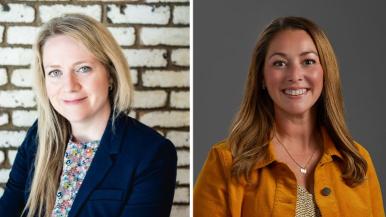A changing climate is impacting the way health care professionals think about patient care. This Earth Day, two members of the RUSH College of Nursing speak about how they conceptualize their role in education, research and advocacy.
Linda O’Kelley, MS, RNC-NIC, is a student in the PhD in Nursing Science program and Heide Cygan, DNP, RN, PHNA-BC, is an associate professor in the Department of Community, Systems and Mental Health Nursing. Here they delve into their research and how they are helping prepare the next generation of nurses.
How do you address climate change in your work?
LO: My research examining the community-level effects of air pollution exposure has led me to political advocacy work to reduce environmental exposures and address climate change. Throughout my time as a student at RUSH, I have had the opportunity to present evidence for the resulting health effects of exposure to environmental contaminants in my publications and presentations. However, I have found that the most impact can be made when talking directly to environmental policy analysts and lawmakers, advocating for stricter air regulations to reduce air pollutants and carbon emissions.
HC: My work focuses on preparing nurses and other health care professionals to address climate change in their professional work. I am fortunate to be able to educate current and future health care professionals both in my role as an associate professor and through professional development at RUSH and across the country.
What role do nurses and other health care professionals play in addressing climate change?
LO: Nurses have a special vantage point to see firsthand the health impacts of environmental exposures and climate change for the populations they serve. Nurses are also well-respected members of society and have a strong collective voice. This voice can be amplified when joining professional organizations that work to combat climate change and harmful environmental exposures.
HC: Nurses are in a unique position to address climate change with our patients. We are often the first to see the negative impacts of climate change on human health. We understand the impact the changing environment has on individuals and communities, and we are trusted by our patients. Professional nursing organizations also recognize the ethical and professional obligation of nurses to act when we see outside forces harming our patients and communities.
How does a changing climate impact people in our community?
LO: Climate change and resulting increased air temperatures are known to exacerbate exposures to multiple environmental hazards. My research focuses on environmental chemical exposures, but there are numerous other environmental hazards, such as excess heat, increased air pollution, severe weather, water contamination and disruptions in the food chain, which threaten human health.
HC: Climate change impacts the health of the community in so many ways! One example to recall was the smoke from wildfires in Canada impacted our ability to go outside last summer. Thousands of miles away, we were cautioned to remain indoors and avoid exposure to wildfire particle matter. This was dangerous for all of us, but specific populations were harmed even more than others. Those working in jobs such as construction don’t have the option to stay indoors to avoid exposure. People living in homes without air conditioning don’t have the option to keep windows closed to avoid exposure. Some may say that climate change will not impact us for generations, but the reality is that it is impacting us now, particularly those who are already vulnerable.
Why is it important for future health care professionals to learn about climate change?
LO: The environment is a major determinant of health. Like genetics, behavior, social, and economic influences, a changing climate can have an enormous impact on human health. Vulnerable populations, such as children and the elderly, are at a significantly increased risk of experiencing poor health effects due to climate and environmental hazards. Future and current providers should remain educated on all health determinants to best protect their patient populations.
How do you celebrate Earth Day?
LO: I will celebrate Earth Day preparing for an upcoming Climate Action Lobby Day in Springfield, Illinois, and spending time outdoors with my three daughters.
HC: By listening to my seven-year-old daughter’s Earth Day presentation! Last year, after watching me prepare for a presentation about climate change, she surprised me with her own presentation about how to keep the environment healthy. She is planning to do the same again this year. I cannot wait to see what she comes up with!
What do you want other health care professionals to know this Earth Day?
LO: Joining professional organizations to combat climate change is free and open to current and future health providers. See the Alliance of Nurses for Healthy Environments and the Illinois Clinicians for Climate Action for more information and advocacy opportunities. Getting involved at any level can help our patients and communities today, and into the future.
HC: You don’t have to be a climate change expert to talk to your patients about climate change. You do not need to understand the specifics about every greenhouse gas and every scientific driver of climate change. You simply need to understand how climate change impacts your patients’ health. Think about climate change as the newest evidence about what you already know. If you are a pediatric clinician, climate change is simply another aspect of pediatric care. Take the time to learn. Take the time to talk to your patients. Do not wait until you consider yourself an expert because our patients need us today.




